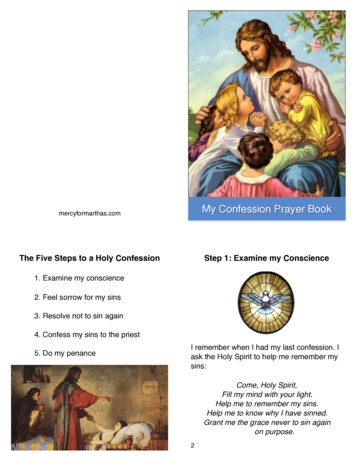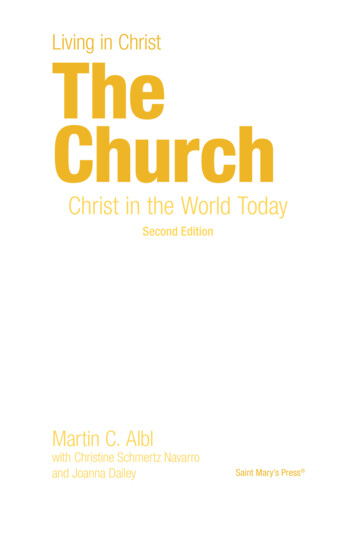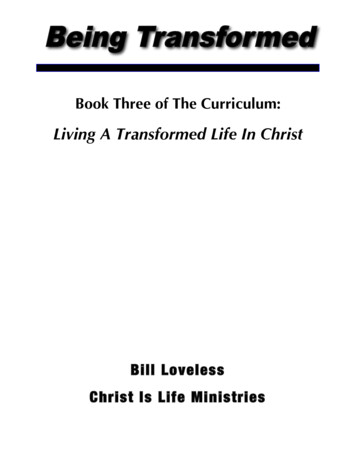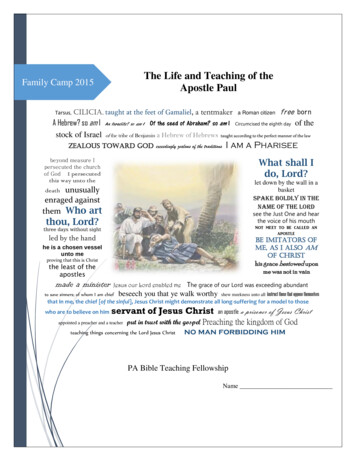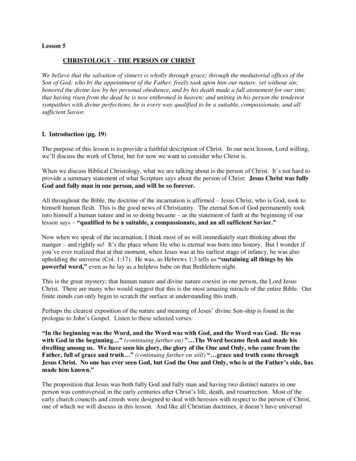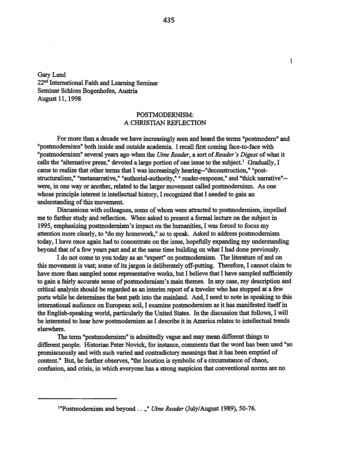
Transcription
4351Gary Land22nd International Faith and Learning SeminarSeminar Schloss Bogenhofen, AustriaAugust 11, 1998POSTMODERNISM:A CHRISTIAN REFLECTIONFor more than a decade we have increasingly seen and heard the terms "postmodem" and"postmodernism" both inside and outside academia I recall first coming face-to-face with"postmodernism" several years ago when the Utne Reader, a sort of Reader's Digest of what itcalls the "alternative press," devoted a large portion of one issue to the subject. 1 Gradually, Icame to realize that other terms that I was increasingly hearing--"deconstruction," "poststructuralism," "metanarrative," "authorial-authority,"" reader-response," and "thick narrative"-were, in one way or another, related to the larger movement called postmodernism. As onewhose principle interest is intellectual history, I recognized that I needed to gain anunderstanding of this movement.Discussions with colleagues, some of whom were attracted to postmodemism, impelledme to further study and reflection. When asked to present a formal lecture on the subject in1995, emphasizing postmodernism's impact on the humanities, I was forced to focus myattention more clearly, to "do my homework," so to speak. Asked to address postmodemismtoday, I have once again had to concentrate on the issue, hopefully expanding my understandingbeyond that of a few years past and at the same time building on what I had done previously.I do not come to you today as an "expert" on postmodemism. The literature of and onthis movement is vast; some of its jargon is deliberately off-putting. Therefore, I cannot claim tohave more than sampled some representative works, but I believe that I have sampled sufficientlyto gain a fairly accurate sense of postmodemism' s main themes. In any case, my description andcritical analysis should be regarded as an interim report of a traveler who has stopped at a fewports while he determines the best path into the mainland. And, I need to note in speaking to thisinternational audience on European soil, I examine postmodemism as it has manifested itself inthe English-speaking world, particularly the United States. In the discussion that follows, I willbe interested to hear how postmodernism as I describe it in America relates to intellectual trendselsewhere.The term "postmodemism" is admittedly vague and may mean different things todifferent people. Historian Peter Novick, for instance, comments that the word has been used "sopromiscuously and with such varied and contradictory meanings that it has been emptied ofcontent." But, he further observes, "the locution is symbolic of a circumstance of chaos,confusion, and crisis, in which everyone has a strong suspicion that conventional norms are no1"Postmodernism and beyond .," Utne Reader (July/August 1989), 50-76.
4362longer viable, but no one has a clear sense of what is in the making. "2 Today I am going to focuson that sense of chaos and confusion, especially as it relates to the issue of epistemology, thequestion of how we know what we claim to know, for that seems to be the common-denominatorelement of postmodernism, no matter who is writing or speaking. I will try to describe brieflythe major sources ofpostmodernist thought: Friedrich Nietzsche, Ferdinand de Saussure, MartinHeidegger, the Frankfurt school, Michel Foucault, and Jacques Derrida. While I can give littlemore than thumbnail sketches of these ideas as they relate to postmodernism, I shall try to be asaccurate as possible. Second, I will offer some general characterizations of postmodernism,particularly as they relate to the humanities. Third, I will give my current-admittedly tentative-assessment of postmodernism. In this assessment, I will speak both as someone concerned withthe nature of scholarship in the humanities and as a Christian who is equally concerned with therelationship of his faith to that scholarship and to contemporary thought patterns.Intellectual foundations ofPostmodernismTo speak of postmodernism assumes that there is something called modernism. Briefly,modernism refers to the Western cultural movement that emphasized reason and expressed itselfmost fully through science. Philosophers such as John Locke, Immanuel Kant, and G. W. F.Hegel sought to understand the world on the basis of reason. Francis Bacon and Isaac Newtonshaped modem science as empirical in methodology and rational in interpretation, regardingphysical reality as operating on the basis of natural laws. The eighteenth-century Enlightenmentsought to apply reason and science to all of reality, what postmodernists pejoratively refer to asthe "Enlightenment Project." In the nineteenth century, efforts were made to turn history into ascience through the discovery of historical laws. Auguste Comte founded the discipline ofsociology for the purpose of studying society according to scientific principles. Karl Marxsought to base revolution upon a scientific understanding of human economic behavior. Thetwentieth century has witnessed the further development of this scientific endeavor across theacademic disciplines. But it has also brought environmental degradation, totalitarianism in thename of science, two world wars using the most advanced technology, and atomic destruction.3It is no wonder that a reaction arose against reason and science. The most recent of thesereactions is postmodemism.Although I have seen the postmodernist outlook traced back to David Hume, theeighteenth-century Scottish philosopher, and even to St. Paul, most accounts regard FriedrichNietzsche (1844-1900) as the father or forerunner of this movement. It was Nietzsche whointroduced the mad man announcing that God was dead. With God dead, there was no longerany fundamental basis to things, no foundation. Modem Western civilization faced a crisis,2Peter Novick, That Noble Dream: The 'Objectivity Question' and the AmericanHistorical Profossion (Cambridge: Cambridge University Press, 1988), 524.3For excellent surveys of modem Western thought, see Franklin L. Baumer, ModernEuropean Thought: Continuity and Change in Ideas, 1600-1950 (New York: MacmillanPublishing Co., 1977); and Richard Tamas, The Passion ofthe Western Mind: Understanding theIdeas That Have Shaped Our World View (New York: Ballantine Books, 1991), 248-445.
4373Nietzsche believed, although it did not yet recognize the gravity of the situation.The death of God, the dissolution of the foundations upon which Western culture rested,offered an immense opportunity, in Nietzsche's view, if only man would grasp it. "Instead oflamenting the absence of a world suited to our being, we invent one," Alan Megill summarizesNietzsche's outlook. "We become the artists of our own existence, untrammeled by naturalconstraints and limitations. "4Two related concepts flow from Nietzsche into postmodernism. First, the Germanphilosopher challenged all systems of truth and morality as tyranny, praising instead thosethinkers original and brave enough to offer alternatives to existing value systems. And yet theseoppositions have significance only as forces of dissolution, for there can be no legitimate newsystem to replace the old, no culmination or closure, only a continual process of creation anddestruction, "a circuitous journey without return, a crisis without resolution, a dislocation withoutreintegration. "5This challenge to dominance rests upon Nietzsche's belief that we human beings have noaccess to reality, his second major influence on postmodernist thought. Knowledge of things asthey actually exist, whether ourselves or external reality, is impossible. What we think of asknowledge is instead a human creation, an illusion or artistic construct. The language throughwhich we express our knowledge is a self-contained world, entirely separate from reality andpurely arbitrary in its formation. Language development "'did not . proceed on logical lines,'"Nietzsche wrote, "'and the whole material in which and with which the man of truth, theinvestigator, the philosopher works and builds, originates, if not from cloud cuckoo land, at anyrate not from the essence of things.' "6What we call truth, therefore, is a human construct that speaks only to our "aestheticapprehension" 7 of reality rather than reality itself. This view applies not only to humanisticknowledge such as philosophy and literature but scientific knowledge also. In brief, languageand reality are the same thing. For Nietzsche "the truth of language is in language, not outsideit." Megill concludes. "Language is a prison from which escape is utterly impossible."8 To askhow correct our language is or the ideas it conveys are, is to pose an irrelevant question.Nietzsche's view of language received further support from Ferdinand de Saussure (18591913), who understood language as a system of mutually defining signs. According to Saussure,4Alan Megill, Prophets ofExtremity: Nietzsche, Heidegger, Foucault, De"ida (Berkeley:University of California Press, 1985), 34.5Megill, 19.6Friedrich Nietzsche, "On Truth and Falsity in an Extra-Moral Sense," trans. M. A.Mugge, in The Complete Works ofFriedrich Nietzsche, vol. 2, ed. Oscar Levy (New York:Russell & Russell, 1964), 179; quoted in Magill, Prophets, 51.7Megill, Prophets, 51.81bid., 95.
4384"Language is a structure, a functioning whole in which the different parts are determined by oneanother. In fact, no linguistic sign means anything by itself: it only acquires value by beingdistinguished from other signs in the language."9 Saussure's understanding strongly influencedthe structuralist school that emerged in France in the 1930s under the leadership of Claude LeviStrauss (1908-). 10Meanwhile, Nietzsche's notion of a cultural crisis resulting from the death of Godprovided the starting-point for Martin Heidegger (1889-1976), who has been described as themost influential philosopher of the twentieth century.11 From the mid-1920s on, Heidegger wasconsumed with the problem of "nihilism," defined as "living within a state of crisis, within apresent that is absolutely derelict. "12Influenced by Nietzsche, Heidegger abandoned the representational understanding oflanguage that appeared in his first major work, Being and Time. Now he concluded that themeaningless void could only be faced meaningfully through the creative power of the word."The. Word alone gives Being to the thing," 13 he wrote. "In the naming, the things are called intotheirthinging. Thinging, they unfold world, in which things abide and so are abiding ones." 14 Inbrief, language creates the reality that we know. Furthermore, "It is not we who create language,but language that gives itself to us. On such grounds there is no difference between language andreality."ISHeidegger differed from Nietzsche in two important respects. First, he was genuinelyinterested in art, particularly poetry, and built much of his understanding of language fromartistic examples. Secondly, he held a mystical, perhaps even religious, stance toward language.Rather than analyzing language, he ultimately wanted to experience it and through thatexperience come into contact with Being, which will ultimately transform us. 16 But both thinkers9Alvar Ellegard, "Study of Language," in Dictionary ofthe History ofIdeas: Studies ofSelected Pivotal Ideas, vol. 2 (New York: Charles Scribner's Sons, Publishers, 1973), 672.1 adan Sarup, An Introductory Guide to Post-Structuralism and Postmodernism, 2nd ed.(Athens: University of Georgia Press, 1993), 2-3; Anthony Woodiwiss, Postmodernity USA: TheCrisis ofSocial Modernism in Postwar America (London: Sage Publications, 1993), 148-49.11Megill, Prophets, 128.12Ibid., 118.13Ibid., 166.14MartinHeidegger, Poetry, Language, Thought, translated and with an Introduction byAlbert Hofstadter (New York: Harper & Row, 1971), 199-200; quoted in Ibid., 168.15Megill, Prophets, 169.161bid., 177-78.
4395were united in the belief that through their language humans create reality.Another German source for postmodem thought was the "Frankfurt school," composed ofindividuals associated with the Institute for Social Research, founded at the University ofFrankfurt in 1923. Theodor Adorno (1903-69) and Max Horkeimer (1895-1973) seem to havebeen the first to describe the Enlightenment as authoritarian. 17 They argued that Enlightenmentreason translates the specific, material world into abstract concepts and thereby shapes the waywe know that world. For example, mathematical consciousness sees the world as mathematical.By then demanding that everyone see the world in these terms, because this is allegedly the"true" nature of the world, Enlightenment thought becomes totalitarian. As Thoms Dochertydescribes it, knowledge then becomes "a power over the consciousness of others who may be lessfluent in the language of reason. Knowledge thus becomes caught up in a dialectic of masteryand slavery in which the mastered or overcome is not nature but rather other human individuals. . . From now on, to know is to be in a position to enslave." 18In the post-World War II period, a number of French thinkers who rebelled against thedominance of structuralism, which posited an objective universal-mental code underlying allhuman cultures, were attracted to the ideas ofNietzsche and Heidegger. Often called "poststructuralists," writers such as Michel Foucault (1926-84) and Jacques Derrida (1930--) objectedto structuralism's assumption of a stable code "The new movement implies a shift from thesignified to the signifier," Madan Sarup writes, "and so there is a perpetual detour on the way to atruth that has lost any status or finality . Post-structuralism, in short, involves a critique ofmetaphysics, of the concepts of causality, of identity of the subject, and oftruth." 19In this rebellion against structuralism, Foucault is most fully Nietzsche's heir. Like hisforerunner, Foucault regarded the order of things--past, present, and future--as necessarilydegraded and the function of the intellectual to be their constant opponent. Because knowledgeis a part of any given order's attempt to control and subject, it too must be undermined. "There isno such thing as 'objective' knowledge. . . . Any claims to objective knowledge, to valid theory,are merely attempts to exercise power of one sort or another. "20As with Nietzsche, Foucault put forward no goals. Just as thought liberates one from the'7Max Horkheimer and Theodor W. Adorno, Dialectic ofEnlightenment, trans. JohnCumming (New York: Herder and Herder, 1972). Originally published in 1944.118Thomas Docherty, "Introduction," in Postmodernism: A Reader,(New York: Columbia University Press, 1993), 5.19Sarup,ed: Thomas DochertyIntroduction, 3. It should be noted that structuralism and post-structuralism havemuch in common. Norman Cantor, for instance, identifies three such commonalities: 1. thesystem rather than the individual has the ultimate reality; 2. language systems provide thefundamental mental structures; 3. deep structure operates in both the conscious and unconsciousrealms. See Norman F. Cantor, The American Century: Varieties ofCulture in Modem Times,Picture Essays by Mindy Cantor (New York: HarperCollins Publishers, 1997), 449-50.2'Megill,Prophets, 195.
4406present order, it creates a new oppressive order to replace the old. "Given the enslavingtendencies of all thought, all interpretation, all discourse, and all language, one is finitelyjustified in opposing all orders." 21 Norman Cantor writes that "for Foucault all moralaffirmations disintegrate into thrusts for power and manipulative domination. There is no ethicalsystem that rises above the corrosive force of total moral relativism. "22Knowledge must be expressed through language, but language, Foucault argued, is onlydiscomse-words and ideas interacting with other words and ideas, not--in the representationalsense--with things in themselves. Because we live only in this world of discourse we can, ofcourse, challenge an existing discourse with an opposing discourse. Therefore, Foucault sidedwith excluded or marginal groups, particularly homosexuals, to subvert the existing order. But ifone of these marginal groups was to become dominant, he would ally himself with anothermarginal group to oppose it.All discourse, however, whether of the dominant or marginal is fictional in the sense thatit creates its own reality. There is no such thing as truth in terms of an accurate representation ofan external reality. Everything is interpretation and whatever interpretation is dominant holds itposition because of power. There is no natural order with which we humans are to achieveharmony. Our task is simply to attack the realm of power.Jacques Derrida, as with Heidegger and Foucault, is preoccupied with language. Becausewe have no immediate vision of reality, the thing in itself, we are dependent upon speaking andwriting. As with Niemche, Derrida believes that this situation offers us a great opportunity,because "writing and interpretation come to be valued not because they can reveal to us the lightof truth but because they are themselves truth."23 The death of god allows us, indeed requires us,to work out our own meaning.But Derrida goes far beyond Niewche in asserting that the very meanings we work outare themselves ambiguous, inconsistent, and contradictory. He, therefore, proposed"deconstructing" texts, analyzing "all aspects of language, including metaphors, the etymology ofwords, symbols, inadvertent puns, Freudian slips." Such deconstructive reading shows that thetext does not contain any self-evident meaning. "Derrida' s aim, . " Allan Megill comments, "isa systematic dismantling of message sending structures. "24 Indeed, there are "infinite meaningsin the text . ," observes Norman Cantor. "There is . a structural impossibility of imposing a:finity and a fixity, or a conclusion, to textual signification."25In fact, Derrida is attacking what he calls the "logocentric" Western tradition, the entireeffort of the West to penetrate the meaning of things through words organized into a rational21Ibid.22Cantor, American, 464.23Megill,24Prophets, 305.Ibid., 332.25Cantor, American, 455-56,
4417pattern. Such an effort, he seeks to show, is impossible, indeed foolish. Because texts do not saywhat their authors intend them to say, we may interpret the text in any manner we wish. 26 Thegoal is simply to interpret. "The manipulation of words and letters1' is "something close to an endin itself." In short, for Derrida, there is nothing beyond the letter, no primal voice speaking along-concealed truth.27Of course, to have even attempted this brief exposition of Denida is to contradict hisprinciples, for--as he would say--what he has written does not "mean" anything. Instead, what heis trying to do is show--not explain--the game of interpretation and through showing engage us inthe game, drawing us into a play of words, associations, and sounds, among other things, thatwill be so satisfying in itself that we will have no urge to search for meaning and truth.Although there are important differences among these various thinkers, they laid thephilosophical foundations for postmodernism. We might identify three primary contributions.First, human beings have no access to reality and therefore no means of perceiving truth.Second, reality is inaccessible because we are caught up in a prison-house of language thatshapes our thought before we think and cannot express what we think. Third, through languagewe create reality and thus the nature of reality is determined by whoever has the power to shapelanguage.Interestingly, American academics became interested in French post-structuralism aboutthe time that it went out of style among French intellectuals. As Richard Pells notes, writers whoemerged in the 1970s, such as Alain Finkielkraut, Andre Glucksmann, Philippe Sollers, and JuliaKristeva, "were now less skeptical than their postmodernist predecessors about the objectivity oflanguage or the virtues of rationality. They were also more centrist politically, more enthusiasticabout democratic institutions and individual freedom, and more tolerant of bourgeois society.And they were often appalled by the obsession with multiculturalism and political correctness inAmerica's universities."28 But American academics seized on the ideas ofDerrida and Foucault,among others, because they gave a vocabulary to support the empowering of marginal groups,provided a theoretical base for attacking "Eurocentrism," and--not insignificantly--"promised tocreate more jobs for and enhance the stature of America's professors--on campus, if not in theoutside world. "29 In doing so, these academics helped create what we know as "Postmodernism."Postmodernism and the HumanitiesPostmodernism as a recognized intellectual movement began in the late 1960s and early1970s. Some scholars have identified specific dates for its starting point--favorite events include26Whether Derrida, despite statements to this effect, really meant that the critic couldinterpret however he or she wishes is a matter of debate among commentators. See Sarup,Introduction, 52.2'Megill, Prophets, 316.28Richard Pells, Not Like Us: How Europeans Have Loved, Hated, and TransformedAmerican Culture Since World War II (New York: Basic Books, 1997), 317.29Ibid., 316-17.
4428the 1968 student rebellions, particularly in Paris, France, and the 1972 dynamiting of St. Louis,Missouri's Pruitt-Igoe housing project, a prime example of modernist city planning andarchitecture that was ultimately judged a complete failure. 30 But I am doubtful that one singleyear or event can adequately map the movement of ideas.In the handouts you can see two characterizations of postmodernism. Looking over theselists, one is struck by the emphasis on the changing, illusory, and fragmentary nature of ourknowledge. Hans Bertens writes, "In practically all recent concepts of Postmodernism the matterof ontological uncertainty is absolutely essential. It is the awareness of the absence of centers, ofprivileged languages, higher discourses, that is seen as the most striking difference withmodernism."31 In one of the most famous and influential statements on postmodernism, JeanFran is Lyotard contrasts modem thought's "explicit appeal to some grand narrative," withpostmodernism' s "incredulity toward metanarratives. "32 As a result, knowledge can no longer beregarded as dealing with a stable reality. As Thomas Docherty writes, "Epistemology iscontaminated by history," 33 for our position within the cultural milieu shapes our minds.Often referred to as anti-foundationalism, this position arises out of the understanding oflanguage as a self-containing reality, an ongoing interplay of signifiers that have no contact withan external reality. Thus Jean Baudrillard can say that we must allow "for all the possibleinterpretations, even the most contradictory-all are true, in the sense that their truth isexchangeable."34 And, reflecting Foucault and Derrida, Zygmunt Bauman says, "Truth is, inother words, a social relation (like power, ownership, or freedom): an aspect of a hierarchy builtof superiority-inferiority units; more precisely, an aspect of the hegemonic form of domination orof a bid for domination-through-hegemony. "35 Hence, postmodernists frequently speak of"privileged" texts, ideas, and language, whose importance, they believe, arises not out of inherentqualities but from hierarchical power relationships. Lyotard, for example, writes of science's30See, for example, Charles Jencks, "The Post-Modem Agenda," in The Post-ModernReader, ed. Charles Jencks, Academy Editions (London: St Marilin's Press, 1992), 24; andDocherty, "Introduction," in Postmodernism, ed. Docherty, 35.31Hans Bertens, "The Postmodem Weltanschauung and its Relation to Modernism: AnIntroductory Survey," inA Postmodern Reader, eds. Joseph Natoli and Linda Hutcheon (Albany:State University ofNew York Press, 1993), 64.32Jean-Fran is Lyotard, The Postmodern Condition: A Report on Knowledge, trans.Geoff Bennington and Brian Massumi, with a Foreword by Fredric Jameson, Theory and Historyof Literature (Minneapolis: University of Minnesota Press, 1984), xxiii-iv.33Thomas Docherty, "Introduction," in Postmodernism, ed. Docherty, 24.34Jean Baudrillard, "The Precession of Simulacra," inPostmodern Reader, eds. Natoliand Hutcheon, 355.Zygmunt Bauman, "Postmodemity, or Living with Ambivalence," in Ibid., 11.35
4439dominant role in Western civilization as a form of"cultural imperialism."36Because it sees truth as a symbol or expression of power, postmodernism emphasizeswhat it often calls the "Other," marginal groups such as people of color, women, homosexuals,and third-world peoples who can challenge the "center" or locus of power. In one typicalpostmodernist statement, Henry Giroux asserts,In challenging the notions of universal reason, the construction of a white, humanistsubject, and the selective legitimation of high culture as the standard for cultural practice,postmodem criticism has illuminated how Eurocentric-American discourses of identitysuppress difference, heterogeneity, and multiplicity in its efforts to maintain hegemonicrelations of power. "37Giroux therefore calls for a politics of otherness and a curriculum of otherness that challengesracism, sexism, and other forms of domination.Because there is no foundation to any knowledge, postmodernism favors a pluralisticunderstanding of truth. Architectural critic Charles Jencks writes of "the end of a single worldview and, by extension, 'a war on totality,' a resistance to single explanations, a respect fordifference and a celebration of the regional, local and particular."38 Saying much the same thing,but from a different angle, Thomas Docherty states that the world lives "at different speeds, indifferent times, in different places. In short, there is not one world (nor even three), but rathermany; all being lived at different rhythms, none of which need ever converge into harmony."39Postmodemism seeks, therefore, to incorporate this very heterogeneity into its approach to theworld.40Beginning as early as the 1960s, these views cut a wide swath across the academicdisciplines in the United States. Thomas Kuhn's The Structure ofScientific RevolutionS'1prompted a contextual or external understanding of the scientific process. Nelson Goodman,Hillary Putnam, and Richard Rorty led the attack on foundationalism in philosophy.Anthropologist Clifford Geertz approached culture as a text while his younger colleaguesregarded their ethnographic work as "negotiated" and "constructed." In psychotherapy, RoySchafer offered the "narrative method" as a means to construct a second reality. The Critical36Lyotard, Postmodern, 27.37Henry Giroux, "Postmodemism as Border Pedagogy: Redefining the Boundaries ofRace and Ethnicity," in Postmodern Reader, eds. Natoli and Hutcheon, 467.38Jencks, "Post-modem Agenda," in Post-Modern Reader, ed. Jencks, 11.390ocherty, "Introduction," in Postmodernism, ed. Docherty, 18.40Jim Collins, "Post-modernism as Culmination: The Aesthetic Politics of DecenteredCultures," in Post-Modern Reader, ed. Jencks, 96.41Thomas S. Kuhn, The Structure ofScientific Revolutions, International Encyclopedia ofUnified Science (Chicago: University of Chicago Press, 1992).
44410Legal Studies movement, as represented by Morton Horwitz and Robert Gordon, sought torelativize and deligitimatize legal consciousness through the use of history and literarycriticism.42 The new interdisciplinary field of "Cultural Studies" regarded all aspects of societyas an interconnected whole to be studied as "signifying practice. "43But with its emphasis on language, it is not surprising that postmodernism has probablyexperienced its greatest expression in literary criticism. In a general sense, the very fascinationwith theory that pervades contemporary literary scholarship illustrates the postmodernist beliefthat everything is interpretation. But particular approaches to literature more clearly illustrate thepostmodernist trajectory.Stanley Fish has been a leader in the approach to literature known as "reader-response"theory. In his book Is There a Text in This Class? he recounts the development of his thought.In contrast to the modernist assumption that a literary text has a fixed identity which it is the jobof the critic to uncover, Fish first argued that the text has a structure that is the same for allreaders but that the work's meaning lies in the reader's experience. But after furtherexamination, he determined that it is the reader who decides what formal patterns are important.Later, he found that the reader supplies the formal patterns. Finally, he concluded that the readerdoes not act independently but is a member of an interpretive community which shapes the waythe reader reads the text. "The claims of objectivity," he says, "can no longer be debated becausethe authorizing agency, the center of interpretive authority, is at once both and neither [the text orthe reader]. "44 Another pioneer in reader-response criticism, Norman Holland, argues that"readers respond to literature in terms of their own 'lifestyle' (or 'character' or 'personality' or'identity. '"45 While in Holland's view the text does limit the range of possible interpretations,46the reader largely determines its meaning.47Other critical schools, including formalism, semiotics, deconstruction, feminism, andneo-Marxism, have also in various ways decentered the author and the text. The critic pursuescriticism as another art form-as one text interacting with other texts-because it is no longerpossible to identify the "meaning of the text in reference to any generally valid criterion of value,42Peter Novick surveys the impact of anti-objectivism on academia in Noble Dream, 523-72.43See "Symposium: Intellectual History in the Age of Cultural Studies," InteiiectualHistory Newsletter, 18 (1996), 3-69.44Stanley Fi
Gary Land 22nd International Faith and Learning Seminar Seminar Schloss Bogenhofen, Austria August 11, 1998 435 POSTMODERNISM: A CHRISTIAN REFLECTION For more than a decade we have increasingly seen and heard the terms "postmodem" and "postmodernism" both inside and outside academia I recall first coming face-to-face with



